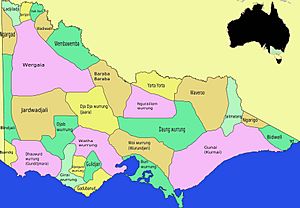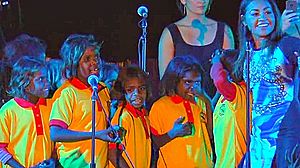Yorta Yorta facts for kids

The Yorta Yorta people, also known as Jotijota, are an Aboriginal Australian group. They have traditionally lived near where the Goulburn River and Murray River meet. This area is in north-eastern Victoria and southern New South Wales today.
Contents
Yorta Yorta Names and Meanings
The name Yorta Yorta comes from their word for "no," which is yota or yoda. Many other Aboriginal groups in the Murray River area also named themselves by repeating their word for "no." Examples include the Wemba-Wemba and Latjilatji peoples.
Historian Norman Tindale listed other names used for the Yorta Yorta people in 1974. These names include:
- Arramouro
- Echuca tribe (used for Yorta Yorta groups south of the Murray River)
- Ngarrimouro
- Woollathura
- Yotayota
The Yorta Yorta Language
The Yorta Yorta language is unique. It might be a language isolate, meaning it's not closely related to other languages in the Pama-Nyungan language family. However, it is often grouped with the Yotayotic branch of that family.
This language was spoken as a group of closely related dialects. People spoke it on both sides of the Murray River, from Echuca to the Cobram/Tocumwal area. It was also spoken along the Goulburn River, reaching as far as Mooroopna and Shepparton.
The Yorta Yorta language was the main language for many of these groups until about 1960. Today, parts of the language are still passed down through families by descendants.
How Yorta Yorta Communities Were Organized
The Yorta Yorta people were traditionally divided into different family groups called clans. In the 1840s, a person named Edward Micklethwaite Curr listed ten of these clans. Some of them were:
- Wongātpan
- Tōwroonbanā
- Wollīthiga
- Moītheriban
- Pikkolātpan
- Ngarrimōwro
These numbers might show how many people lived in these areas long ago. Evidence from old cooking mounds suggests there were more people living there in the past. Sadly, smallpox epidemics also greatly reduced the population.
Today, the term Yorta Yorta includes several different historical tribes and family groups. These include the Bangerang and Kwatkwat tribes. Clan groups like the Kailtheban, Wollithiga, Moira, and Ulupna are also part of the Yorta Yorta Nation.
Native Title Claim and Agreements
In 1995, the Yorta Yorta people made a Native title claim. This claim asked for recognition of their traditional land rights. In 1998, the court decided that the "tide of history" had "washed away" their traditional laws and customs. The Yorta Yorta appealed this decision, saying the judge did not understand how traditional laws can change over time. However, the appeal was dismissed. The case went to the High Court of Australia in 2002, but it was also dismissed.
Even though the native title claim failed, the Victoria State Government signed an important agreement with the Yorta Yorta people in 2004. This agreement allows the Yorta Yorta people to have a say in managing public land, rivers, and lakes in their traditional country. This includes places like the Barmah State Park and Kow Swamp. The Environment Minister still makes the final decisions.
Yorta Yorta Nation Aboriginal Corporation
The Yorta Yorta Nation Aboriginal Corporation (YYNAC) was started in 1999. It works to support the Yorta Yorta people. Its main office is in Barmah and it has another office in Shepparton.
YYNAC is led by a board of seven directors, including a representative for the Elders. There is also a Council of Elders with 16 family group representatives. A CEO manages the daily work.
History of Yorta Yorta Organizations
In the 1930s, Yorta Yorta activists like William Cooper and Sir Douglas Nicholls helped create the Aborigines Advancement League (AAL). This group worked for Aboriginal rights. In 1975, the AAL made a claim for the Barmah Forest, but it was rejected.
The Yorta Yorta Tribal Council (YYTC) was formally set up in 1983. It continued the work of the AAL. It also made a claim for the Barmah Forest in 1984, but this was not successful either.
The Yorta Yorta Tribal Council was later replaced by the Yorta Yorta Clans Group (YYCG) in 1989. This new group covered a larger area of traditional Yorta Yorta land. The YYCG was then replaced by the YYNAC in 1999.
Joint Land Management
In 2010, the State of Victoria made an agreement with the Yorta Yorta called the Traditional Owner Land Management Agreement. This agreement created the Yorta Yorta Traditional Owner Land Management Board. This board works with the government to manage the Barmah National Park.
The Yorta Yorta Traditional Owner Land Management Board is part of YYNAC. As the recognized traditional owners of the land, YYNAC and the State of Victoria are working together on a joint management plan. Parks Victoria will help carry out this plan, working closely with YYNAC.
Famous Yorta Yorta People
Many Yorta Yorta people have become well-known in different fields:
- Briggs: A popular hip-hop artist.
- Burnum Burnum: An activist, actor, and author.
- Deborah Cheetham: An opera singer and composer.
- William Cooper: A key activist who helped start the Australian Aborigines' League in 1935.
- Isaiah Firebrace: A singer who represented Australia in the Eurovision Song Contest.
- Jimmy Little: A famous musician whose career lasted over 60 years.
- Sir Douglas Nicholls: A professional athlete, pastor, and important campaigner for Aboriginal rights. He was the first Aboriginal person to be knighted.
- Lin Onus: A respected artist.
- Jack Patten: An activist and writer who led the first group of Aboriginal people to meet with a serving prime minister.
- Margaret Tucker: A civil rights activist and writer, known for her part in the 1938 Day of Mourning. She was the first Aboriginal person to publish an autobiography.
- David Wirrpanda: A former AFL football player known for his community work helping young Indigenous Australians.
Yorta Yorta Music
The song "Ngarra Burra Ferra" was sung by Jessica Mauboy in the 2012 film The Sapphires. This song is based on an old Aboriginal hymn called "Bura Fera."
The song is in the Yorta Yorta language. It talks about God helping to defeat Pharaoh's armies. The chorus, "Ngara burra ferra yumini yala yala," means "The Lord God drowned all Pharaoh's armies, hallelujah!" These words come from an ancient Jewish song called the "Song of the Sea" from the Book of Exodus.
It is believed that Aboriginal communities in Victoria and southern New South Wales might be the only people in the world who still sing this song in the Yorta Yorta language.
See also
- Wharparilla Flora Reserve, a small nature area where the Yorta Yorta first met European settlers.
 | May Edward Chinn |
 | Rebecca Cole |
 | Alexa Canady |
 | Dorothy Lavinia Brown |


